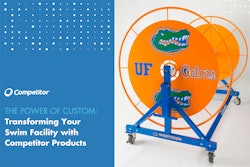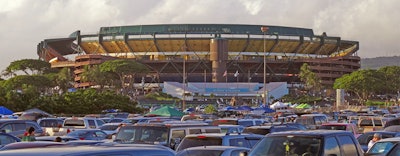
With the countless hours and dollars spent on creating the absolute highest level of fan experience and ensuring fans' personal safety inside a venue, all too often the available assets outside the venue are overlooked and underutilized.
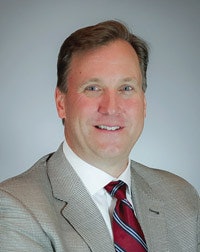 Don Jordan is senior vice president of operations for SP+, a diverse provider of professional parking, ground transportation, facility maintenance, security and event logistics services to real estate owners and managers in a wide array of markets.
Don Jordan is senior vice president of operations for SP+, a diverse provider of professional parking, ground transportation, facility maintenance, security and event logistics services to real estate owners and managers in a wide array of markets.
Law enforcement does the thankless job of managing vehicular traffic that can overwhelm arterial roadways feeding the venue, keeping pedestrians safe in the process and reacting quickly when circumstances get serious. In most cases, what officers cannot be focused on is stepping away from their posts temporarily to assist with directions, event information and the general questions that have nothing to do with public safety.
This is where parking crews step in. Parking is generally viewed as a necessary evil of events, a portion of the operation where "no news is good news," and unless complaints become significant, the needed attention and budgetary dollars are too often focused elsewhere in the interest of greater impact. There is always a bigger need operationally than refreshing the signage, restriping the lots, reconfiguring the cab/Uber/Lyft plans, integrating with public transportation in a more deliberate fashion, and actively managing the flow of pedestrians to the venue from the lots.
However, the parking attendant is the first person fans meet when they arrive and often the last person they interact with when they leave. They are impacting what is — combined with traffic — one of the major obstacles to keeping attendees inside venues, where they spend more money on food, beverages and merchandise. Parking attendants can help create an experience that makes fans want to return.
While always cognizant of budgetary constraints, I am reminded of a phrase I learned very early on: "The difference between halfway and first class is just a little more effort and money."
Every venue has its own nuances and exceptions due to various dynamics and constraints, but in general, a venue can achieve a significant boost in both fan experience and security through these operational areas:
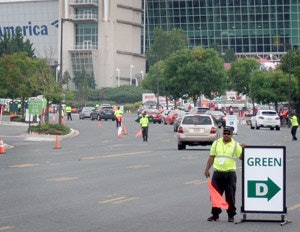 Photo courtsey of SP+
Photo courtsey of SP+
Focusing on parking lot attendants as Ambassadors
"Ushers" or "ambassadors" greeting your attendees before they ever enter the venue can create an improved experience. When we hire and train employees to manage event parking, we focus on hospitality-type attributes. From the point of interviews, pre-employment screenings, and training and orientation, the expectations are built into every step of the process in a similar way to how we would handle a five-star hotel operation. We have several clients who include parking staff in their "Employee of the Month" programs, recognition at certain events and other internal programs that help build even better buy-in from the staff, further breaking down the operational silos that inherently form within an organization.
Ambassadors should be dressed in recognizable uniforms (not team colors) and actively looking for and offering help to fans who look lost or confused. Questions on locations of the box office, will call, the team store, a vendor tent village, team arrivals, etc., can all be answered, helping reduce confusion once the fans enter the venue itself. The high-visibility nature of such uniformed staff supports a greater sense of security in the crowd, as well.
Having more eyes outside the venue can help mitigate situations before they become serious. That same attentive ambassador notices suspicious behavior, objects or situations and can engage the chain of command for proper investigation. Those same eyes watching for fans who might try to "game" the parking operation for free admission or access to more-preferred parking would notice a suspicious car trying to snake its way through a parking lot to get unauthorized access to the venue.
Fan-observation skillset training assists with both customer security and satisfaction. While it may require a few additional personnel outside the venue, the benefits far outweigh the small difference in dollars spent.
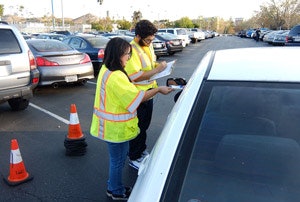 Photo courtsey of University of California Riverside
Photo courtsey of University of California Riverside
Training beyond parking
Parking lot attendants should never be trained just to tend their own area. Orientation and training should include ensuring each individual has a high-level understanding of how the overall traffic and parking operation works at the venue. Staff members who know how the various roads feed into the lots, which constituent groups park in which lots, and how to effectively manage the exceptions of fans who arrive at the wrong place can stave off potential slowdowns and improve the venue experience for everyone.
Daily event briefings are critical to achieving next-level service. These should include the calendar of events, pre- and post-event activities and locations, anticipated crowd size and associated concerns on capacities, as well as a review of any recent events that may offer perspective on how the current event operation might be tweaked accordingly.
The daily briefing should also include any information on things to watch for from the venue command center, a refresher of signs of suspicious activity, and a review of how to handle any incidents properly through the chain of command. As part of the "Aggressive Hospitality" training founded by our USA Parking Division, qualities developed by attendants to truly help attendees also carry over to a desire to help protect them. Given the proper training and information, parking attendants can assist outside the venue, just as so many staff are already doing inside.
RELATED: Designing for Parking and Fan Traffic at Spectator Venues
As one of the first organizations to mandate First Observer security training for all our staff stationed outside venues, we know such training can have a significant impact on how parking staff views their environment. The knowledge and sense of ownership the staff has after such training improves the level of observation provided at every event, and reporting it correctly when something suspicious is observed follows the creed "See Something, Say Something."
Our goal in parking management has never been to take on a larger role than we are qualified to fill, but rather adding eyes and ears to the benefit of security professionals. While they're parking cars and managing pedestrians safely away from vehicular flows, parking attendants are looking for suspicious people and activity. After some time, it becomes second nature to them. Unfortunately, due to budgetary constraints, many times the additional hours for proper training are cut and the ability of the parking staff to contribute to more than just parking is constrained.
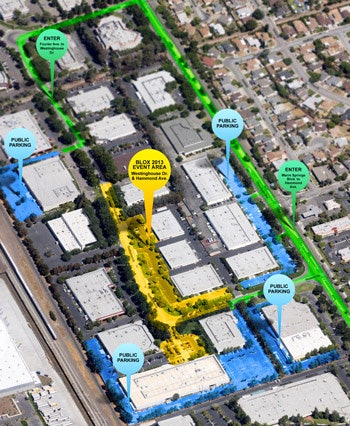 As part of its major import car show in Fremont, Calif., Blox13 provided attendees with a map verifying available parking before the event. | Photo courtsey of GTRlife.com
As part of its major import car show in Fremont, Calif., Blox13 provided attendees with a map verifying available parking before the event. | Photo courtsey of GTRlife.com
Communicating a consistent message
When we design operations and create a supporting communication plan, we follow the 80/20 rule. By providing accurate information electronically via social media and through the physical signage plan, approximately 80 percent of the crowd will know where they need to go and how to get there efficiently, leaving ambassadors free to handle the 20 percent of the crowd that, as we joke, "we could put in a car with a personal driver, and they would still get lost."
The number of inconsistencies we see between website directions and social media information or physical signage is vast but understandable. Everything in a venue or at a specific event evolves, creating a never-ending race to update information pushed out on various outlets.
Confusion can be minimized with some simple quality control: ensure that someone checks hyperlinks, accuracy of directions and parking information, the social media coordinators' script and, most important, the physical signage. Physical signage becomes obsolete rapidly with the temporary and ever-changing nature of event traffic. Operational changes are made from event to event, yet the impact to the signage plan is often overlooked, creating many situations of conflicting information. It is critical that any time an operational pattern is changed, someone physically goes and experiences the change from the fans' perspective, as if it was his or her first time to the venue.
RELATED: How to Keep Sports Venue Parking Lots Safe and Secure
Including parking operations management in the appropriate security meetings, law-enforcement briefings and fan experience meetings can build a more cohesive approach and more efficient flow of information during an event. One of the most helpless feelings we have had during situations outside venues is seeing something suspicious or trying to handle a customer service issue but not having the proper flow of communication or chain of command to go to once engaged. Inclusion in the processes and flow of information provides a better environment for engaged employees with a sense of ownership in their role versus disconnected employees focused purely on parking cars.
Just like any sophisticated supply-chain logistics operation, parking operations is about managing processes and procedures and fully understanding the role parking plays in relation to the bigger picture. With the elimination of the operational silos, parking operations becomes much more than just parking — leading to an improved fan experience and adding another layer of security with more eyes on the operation.
Many venues have already seen the benefits of including parking operations as part of the internal team and are providing both the information and resources that allow parking staff to be about more than just parking. Does it take more time and energy? Yes, but the benefits are obvious once investment leads to full buy-in — more people are in their seats longer during events, and more people budget their entertainment dollars to come back again. Approaching parking from a hospitality perspective changes things dramatically, so much so that in some cases we have had clients contract us to train the staff working inside the venue to the same standards.
This article originally appeared in the Summer 2016 issue of Gameday Security.





















